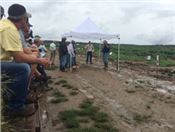Division Of Ag, Ark Soybean Promotion Board Re-Up Agreement, Continue Partnership

Bob Scott, extension weed scientist for the University
of Arkansas System Division of Agriculture discussing
herbicide symptomology at the 2016 Soybean College
at Newport, Arkansas.
U of A System Division of Agriculture photo by Carly Bokker
LITTLE ROCK, ARK.
The University of Arkansas System Division of Agriculture has signed a new five-year agreement with the Arkansas Soybean Promotion Board, a partnership that will continue the research and extension work performed by division faculty to enhance the state’s soybean industry.
“This new agreement will continue the special relationship between the division and the Arkansas Soybean Promotion Board that provides industry-critical breeding programs, verification trials and a variety of new best practices to increase the efficiency and yield for Arkansas’ soybean growers,” said Mark Cochran, vice president-agriculture for the University of Arkansas System and head of the Division of Agriculture.
“The farmer assessments that come through the state checkoff program enable Division of Agriculture scientists to work on specific projects selected and approved by the farmer members of the promotion board,” Cochran said. “These projects are coordinated into the overall Division of Agriculture soybean program.”
The partnership between the Division of Agriculture and the Arkansas Soybean Promotion Board began soon after its establishment in 1971. In the collaboration between the two, the Division of Agriculture provides several dollars in program support for every dollar provided by the promotion board.
Among the successes borne from this partnership include:
• Soymap – A computer program to help producers with irrigated crops determine which maturity group of soybeans is most likely to do the best for them at various planting dates. SoyMap is based on research findings from eight Mid-South locations and covers 16 cultivars from maturity groups 3 to 6. The program incorporates 30 years of weather data.
• Integrated Pest Management training for soybean insect management, including proper scouting, identification of pests and use of decision thresholds to save money on insecticides.
• Comprehensive screening of more than 300 commercial soybean varieties for reaction to disease, nematodes and other problems.
• One of the most intense research programs for management of resistant weeds, including Palmer amaranth, or pigweed. A new program called PAM, for Palmer Amaranth Management, has been recently released to help plan cropping systems and herbicide programs to better control resistant pigweed over the long term. (See: http://bit.ly/2kClaHm)
• The Arkansas Soybean Science Challenge, which uses soybeans as an entry point for high school students to deepen their knowledge of research and agriculture.
• A broad-based breeding program that released the first public RR1 variety, high protein food grade edamame specialty soybeans as well as adapted conventional varieties.
• Verification trials that validate science-based best management practices on a field scale to improve the profit and sustainability of Arkansas soybean farms.
• Real-time disease management recommendations including practices to prevent and manage fungicide-resistant frogeye leaf spot and other problems.
• Soybean College is an every-other-year event held in partnership with the Arkansas Crop Protection Association. Crop consultants, county extension agents and other industry professionals can see current research on the many production challenges soybean growers face, as well as getting some learn-by-doing experience with hands-on demonstrations.
• Pigposium (http://bit.ly/PigPosium3) is the only event in Arkansas that focuses exclusively on one of the biggest challenges facing Arkansas farmers: herbicide resistant Palmer amaranth. The daylong symposium includes presentations on new research and updates on techniques being tried in the field. The two previous PigPosia were held in 2010 and 2014. ∆